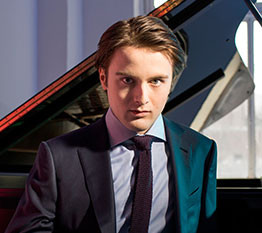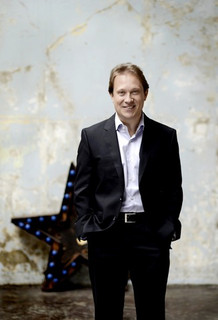|
Back
Happy Trifonov Thanksgiving New York
David Geffen Hall, Lincoln Center
11/24/2015 - & November 27*, 28, 2015
“Rachmaninoff: A Philharmonic Festival”
Sergei Rachmaninoff: Piano Concerto No. 3 in D minor, Opus 30 – Symphonic Dances, Opus 45
Daniil Trifonov (Pianist)
New York Philharmonic, Ludovic Morlot (Conductor)

D. Trifonov (© Deutsche Grammophon)
As we were asked at last Thursday’s dinner what we were each “thankful” for, I never hesitated.
“I’m thankful that the whole month of November has been dominated by a 24-year-old Russian pianist by the name of Daniil Trifonov.”
Non-musicians at the table looked puzzled, but others knew from what I spake. For the entire Rachmaninoff Festival at the New York Philharmonic has been guided by Mr. Trifonov. Each concert has had a different conductor, the New York Philharmonic has reacted differently. But Daniil Trifonov turned each concert, with all the Rachmaninoff concerti (and the Paganini Rhapsody) into a festival of light.
Nor did the final orchestral concert fail to produce pianistic marvels. The Third Piano Concerto is so difficult that not even the composer played the long first-movement cadenza. Those difficulties meant nothing to Mr. Trifonov. Yet his greatness doesn’t come from overcoming difficulties. Other great pianists have challenged the work and won. Mr. Trifonov adds something almost unfathomable.
The difference is that Mr. Trifonov knows gentleness as much as giantism. He didn’t “perform” that opening theme: his fingers brushed against the notes like breezes. In the second movement, those great chromatic octaves were followed by arabesques played with, what seemed like, personal, almost childlike affection. And while the ending was suitably martial, Mr. Tifonov finished it with the ,most delicate two-minute Medtner Fairy Tale.
Still, one must get to the “good part”, the sections which made the audience rise in tutti raptures. For Mr. Trifonov combines the most fiery performance with an uncanny skill. Not a single 32nd-note error in those grand runs up and down the piano. In taking the huge “alternative” cadenza (the one which the composer wrote but didn’t play), Mr. Trifonov offered more than electricity. He accented the themes of the movement, he played it loudly at times, but never got away from Rachmaninoff’s unfailing lyricism.
True enough, there were moments in the first and, emphatically final movements, where the pianist got far ahead of conductor Ludovic Morlot. The Maestro certainly was prepared for that, and scurried to bring, if not peace, than a truce between soloist and ensemble. And anyhow, the composer never called this Concerto for Piano and Orchestra. It was the soloist all the way.
This Sunday, Mr. Trifonov gives a chamber music performances at the 92nd Street Y. Those who have missed his November extravaganza so far would be foolish to miss it. In case tickets are available.
By the way, Mr. Trifonov is now on the Board of the New York Philharmonic. If that means he will return for Official Duties–and can make some guest appearances–our gratitude will be endless.

L. Morlot (© Sussie Ahlburg)
The second half of the evening wasn’t quite in the miracle range. The French-born Ludovic Morlot is an international sensation, though keeping his “day job” with the Seattle Symphony. Conducting that orchestra last year here in John Luther Adams’ Become Ocean, was one of the season highlights.
For some reason, Rachmaninoff’s final large work, Symphonic Dances never really got traction. Rather than springing to action, the orchestra bounced. Rather than a pulsating rhythm, the New York Phil was urged a bit stodgily, so even the solo sax was a relatively woebegone.
Mr. Morlot found his soul with the mysterious waltz of the second movement, giving it a sound in between Ravel’s “noble” and “sentimental” dances. The ending–what unknowing Philistines called “bombast”–was galvanizing, given the suitable energetic command.
True, at times I have considered invading Ukraine after hearing this, and Mr. Morlot didn’t quite change my usual torpor to transport. But being on the stage with Daniil Trifonov is a pretty daunting thing for any conductor, and Mr. Morlot made the best of it.
Harry Rolnick
|